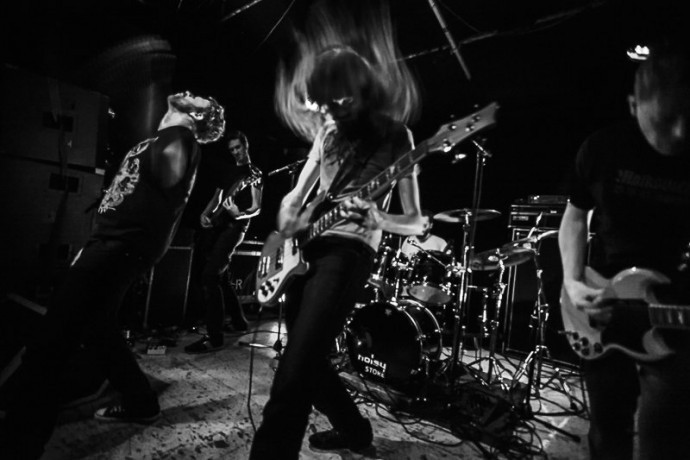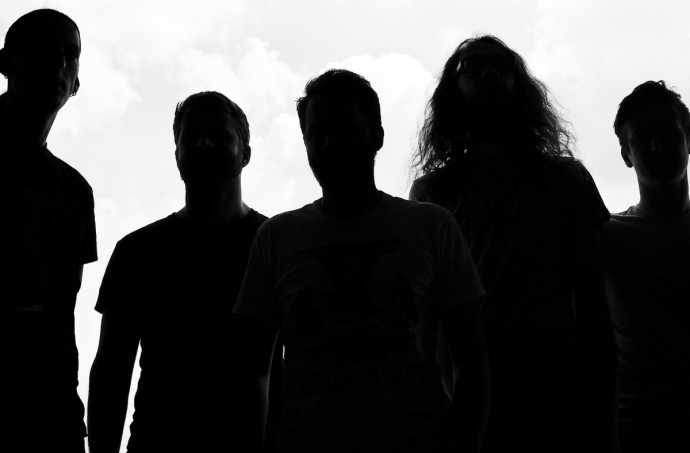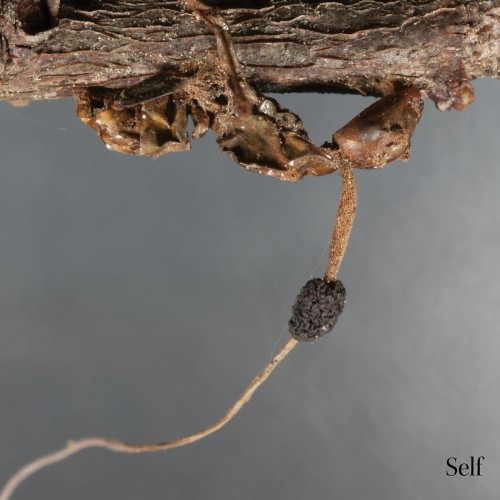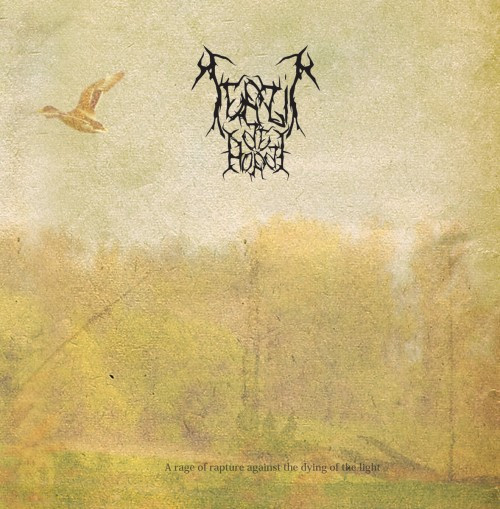(We present Andy Synn’s very interesting interview with members of the Dutch black metal band Terzij de Horde.)
No matter how hard we try, every year there are a number of frankly amazing bands/albums we simply don’t get around to covering, despite our best intentions.
Self, by ravenous Dutch dilettantes Terzij de Horde, is one of those albums.
Packed with manic, high-voltage tremolo lines, howling, cathartic vocals, and storm-blasting drum work, it’s undeniably a Black Metal album right down to its darkly cerebral core, but (as you’ll soon discover) the music on Self is just as undeniably rooted in the essential elements of Punk and Crust/Hardcore at their most visceral.
And it’s this fearless embrace of other genres – both their differences and their commonalities – coupled with the band’s penchant for massive, harrowing riffs, nerve-jangling dissonance, and moments of creeping, atypical melody, that make Self such an instantly engaging, endlessly rewarding listen.
I could definitely go on about this album at length, as it really is one of the best releases – Black Metal or otherwise – that came out last year. However, as you’re about to find out, the members of the band themselves (in this case vocalist/lyricist Joost Vervoort and bassist/lyricist Johan van Hattum) proved themselves to be extremely capable and interesting interview participants, and so I’m more than happy to let their words do all the heavy lifting this time around!
******
First off, let me just say I have two things I need to apologise for. Firstly, that I never got around to reviewing your stellar full-length debut Self, and secondly that I was unable to make it out to any of the shows on your UK tour last year due to work/illness.
Johan: All is forgiven, good sir. The shows were fairly small since we were coming under our own steam as foreign bands, and Self had yet to make an impact, but we had a blast, mainly due to the amazing organisers and the boys from Laster.
Joost: You can count on us to come back to the UK at some point in the near future, so you’ll have another chance.
Thank the dark lord for that… anyway, it’s always a good idea to get the introductions out of the way first so… who the hell are you, what’s your band called, and why the hell should anyone listen to your god-awful racket?
Johan: Overall, this is a question we get asked all the time. And so it’s difficult to give this an original answer. Hence: we are Terzij de Horde. Joost is our singer and an Oxford scholar, Richard plays the drums and is a web-developer, Demian plays guitar and is a beer brewer, Jelle is also a guitar player and works in art and marketing, lastly I play bass and am a teacher and a researcher in linguistics, focusing on the English language.
Joost: Terzij de Horde is a line of poetry by ‘vitalistic’ Dutch poet Hendrik Marsman – which can be interpreted as set apart from the horde, or the masses – set beyond the constraints of common thoughts, interests and values. In the band, we draw first of all from an overflowing drive to live fully, and to rail against and overcome boundaries created by fear and stupidity. The band’s music and lyrics are a funnel for that drive, which, when it clashes with the world, can become violently antagonistic. All of this is captured in music with a Black Metal basis but with a wide range of other influences. If that sounds pretentious to you, then you might want to listen to something else, because it only gets worse from here.
Johan: Listen to Terzij de Horde if you like sincere, intense Black Metal with thoughtful lyrics. Or if you want to expand your vocabulary. Or if you hate hipster Black Metal. Or when you love it.
On a (slightly) more serious note, you released your first EP, A Rage of Rapture Against the Dying of the Light, way back in 2010… but then it took around five years before you finally released your debut full-length album… what took you so long?
Joost: Simply put, because we follow our own mentioned creed of ‘live fully’, our lives, and therefore our time schedules, are always overflowing with activity, and much has happened: children, jobs, travel. In the past five years, moreover, our guitarist Stefan (now in the excellent Osewoudt) left us, which slowed things down considerably for a while. This has had its benefits — over the years up to the release of Self, we’ve been able to put a lot of thought into the details of the songs that comprise the album.
Johan: When Jelle joined we suddenly had a new impetus to work on the full-length. And successfully so, apparently.

Photo © Kasper Vogelzang
To someone unfamiliar with the band, how would you describe the sound of Terzij de Horde (particularly on the new album)?
Joost: The core of Terzij de Horde’s sound is Black Metal, but there is a fiery urgency to it which comes from the extreme fringes of Punk –we have backgrounds in those styles. I would also describe our music as highly dynamic and full of musical ideas. Part of the dynamism comes from the use of slower, more doomy elements. For the recording of Self, we chose a sound that was more direct and concrete than is usual in Black Metal, because we want everything extremely close to the listener – just like we play our live shows.
Johan: It is a harsh, punch-in-your-face variety of Black Metal.
It’s something of a cliché question I know, but when you were first putting the band together, who were your main influences/inspirations, and what were your original goals?
Joost: A friend (Lucas Rutting) and I started the band because we were in awe of the raw power and energy of Extreme Noise Terror. We wanted a band like that. Johan was immediately keen to join, and when we found our drummer Rutger Muller, the result was a wild, chaotic mess of Screamo, Crust/Hardcore and Grindcore, with some Black Metal elements. Our goals then were just to play intense shows and destroy ourselves on stage, all accompanied by terrible humour.
Johan: The ‘loud and intense’ part stuck throughout the past 9 years, but musically we changed a lot. It was a natural progression; as we changed drummers and guitarists, our sound changed as well.
Well, that leads nicely into my next question… how have you, as people, changed and developed over the intervening years between your first EP and your new album?
Joost: Importantly, we went from one to two guitarists. At the time of the EP, songs were written by Stefan, Johan, and myself. When Demian Snel joined us, he brought his own style of song-writing with him, arguably more focused on concrete and elaborate riffs. Overall, with two guitarists, the sound became more layered. Song structures have become more intricate.
In the years between the EP and the album, all of our lives have changed very rapidly, with a lot of new professional and personal challenges having come up. I’d say that this has given all of us a more multi-dimensional perspective on life, and more resources to draw on for the music. Johan and I, as lyrics writers, continued to read and research widely regarding both professional academic and personal interests – and all of this has affected the album’s lyrics.
Johan: As we were writing for the full-length, the sound became clearer, both literally and figuratively. Since it took us 5 years, loads of riffs and songs have died along the way as they were not good enough, or did not fit into the overall sound and idea. We have become more critical, and remain so.
Obviously you weren’t exactly idle for those years either, as you released a number of tracks via splits and single releases during that period. So I thought it might be nice to have you say a few words about each one individually, before we move on?
- “A Chosen Hollow” – Starve /Terzij de Horde split (2012)
Johan: The first lyrics that were written by Joost and Johan together. And the first track that touched upon what we were going for with the full-length. The guys in Starve have been friends of the band for a long time, and back then it seemed an excellent idea to team up with friends who could share in the themes and darkness of this track, but then approach it from another perspective. We still love this track, as well as the record.
- “Seeping Through the Cracks” – Elemental Nightmares VI (2014)
Johan: The official goodbye to Stefan. Stefan and Johan used to play in Cameron, a Screamo/Post-Metal band, and brought a lot of ‘old’ Screamo to the rest of the band. Neil Perry, the band we covered here, is a band loved by all of us, since they combine a ferocious intensity with an incredibly heavy sound. Their rhythm section is astounding. We had been talking about this cover for a while, so when Elemental Nightmares approached us for a short track for a compilation, we knew what to do.
- “Wacht / Lex Barbarorum” – Digital Single (2015)
Joost: We had been discussing the need for more translations of Marsman’s work – since only three of his poems had been translated to English, in the fifties. When playing abroad, many people would be curious about Marsman’s work. Since Johan is a teacher and researcher of the English language, and I’m based at Oxford University and therefore work in English as well, we felt up to the task of translating our favourite poems ourselves, but to make sure our translations were robust, we asked support from a professional translator, Bram van Yperen.
The release of our book of translations (released 75 years after Marsman’s death to the day as a commemoration) seemed to be the perfect occasion to put Marsman’s poetry to music. We chose the poems ‘Wacht’ (Vigil) and ‘Lex Barbarorum’ (which translates as ‘law of the barbarians’) to be used in one song because of their thematic succession – ‘Wacht’ is about despairing at the vigil of life, and ‘Lex Barbarorum’ is about overcoming inner darkness and embracing life as the highest law.
Let’s focus in on the album now. The title is, simply and starkly, Self, and I’m very aware there’s a distinct concept underlying the record as a whole. Rather than trying to mis-translate and mis-transcribe it myself, would you be able to explain what that concept is, and how it’s incorporated into the music and lyrics?
Joost: The problem of self, of living with the subject, the separation of self and world, has been approached in myriad ways since time immemorial – in philosophy, religion, art, and by all who have ever lived, in some way. The self is intimately linked to notions of freedom and enslavement, separation and connection, suffering and creating, individualism and the power of the world over the individual. This theme has allowed us to explore very different ways of living with the self – which also translates in a diversity of musical themes.
For instance, “Absence” deals with the conflict between self and the world’s dominating forces; “A Marriage of Flesh and Air” focuses on the flourishing of the self and an embrace of the world; “Averoas” explores the searching and suffering self; “Contre Le Monde, Contre La Vie” (partly inspired by Michel Houellebecq’s book about H.P. Lovecraft) discusses the self turning away from the world and finding life and a powerfully creative force in its inner realities; “Geryon – See Extinguished the Sight of Everything but the Monster” deals with the self as it is co-opted and manipulated by outside forces; and “Sacrifice – A Final Paroxysm” is about the end of the self – it remains ambiguous whether that is positive or negative.
In addition, what about the artwork? I’ve seen that engender a surprisingly visceral reaction from some people online. Who came up with the idea/concept behind using that particular image, and how do you feel it represents the contents of the album?
Joost: We had discussed various ideas for the artwork – an interesting challenge with such a fundamental album concept. We veered into the direction of using animal life in some form. A friend of ours is a great researcher focusing on Ophiocordyceps – fungi that take over and control insects, in this case ants, forcing them to move to a high place before they die and the fungus emerges to infect other ants. We thought that this provided a dramatic and visceral image of the self as co-opted by outside forces, while at the same time providing some ambiguity – ants, after all, are a super-organism rather than a collection of individuals; and the Ophiocordyceps itself has its own agency in a way. Finally, the image is dramatic in that the process of invasion and destruction of the limits of the organism is frozen in motion.
Johan: We had some very disturbed people as well. Interesting, that when you put a drawing of a raped nun on the cover, everyone goes ‘ah yeah, Black Metal!’, but when you show the workings of nature some people go berserk with convulsion.
Joost: In the end, we used two pictures, after going through hundreds of dessicated, mouldy ants. It was worth it in the end.
When you were putting the album together initially, were there any specific goals or targets you felt you had to reach? Did you have a specific sound, specific structures or styles, that you wanted to incorporate into the music?
Joost: The theme ‘self’ emerged organically after the first few songs were done. In terms of the sound, the main challenge was to capture the rage of live performances on the album while keeping things direct and concrete. In terms of styles, we just went with whatever we wanted, and the openness of the theme allowed for this.
Johan: There was no real aiming for a specific sound, other than fitting to the lyrics. So, for instance, for “Averoas” we wanted to reflect the eternally searching self in the music, thus it has a more dragging, almost doom-like sound. And for “Sacrifice”, we wanted a raging, ecstatic ending, complete discarding of self. And that goes for the entire record, lyrics and sound should be one.
The songs are also all a little more on the longer side of things (though I’m aware that’s nothing really new for the band). Was it always the plan to let things run a little longer, or was this simply a natural development during the writing sessions?
Johan: All natural, we write and tinker until we all have the idea that the song tells everything it needed to tell. Some songs need a couple of minutes, other songs need more time. This working on songs does take up a lot of time, and it will be the reason for our next record taking longer than one year to be released, but if we are not sure whether the song is done, has reached its full potential, then why should we even consider releasing it? Why would any band do that?
And, while we’re on the subject, do you have any particular favourite tracks to play/perform live or just to listen to in the quiet of your own home?
Joost: As the vocalist, live I particularly enjoy the most aggressive, abrasive songs, they create such a rush of fury. But I love “Wacht/Lex Barbarorum” as well, because of the opportunity to use Marsman’s beautiful Dutch live, and “Sacrifice” because that is the moment we all throw ourselves completely into the music one final time, and the theme of the song fits so perfectly with that experience. At home, I love listening to everything, but perhaps especially “Averoas”, since it’s a real journey. Generally, I love listening to the album – I must have suffered nearly as much damage to my hearing from playing the album at ridiculous volumes at home as I have from playing gigs.
Johan: We all love to play “Sacrifice” as the end of the set, and besides that we all have our personal favourites of course. But come on, ALL OUR SONGS ARE AMAZING. ALL OF THEM.
Going back to A Rage of Rapture… quickly, how do you feel it’s aged? Five years may not seem like a long time in some respects, but in musical terms (at least these days) it’s almost a whole epoch!
Johan: We were talking about that when we were concocting our new set, and it has aged well overall we think. Even though you can clearly hear a band in development, a whole gamut of ideas thrown together in the hope they work, it does hold up. Some tracks better than others perhaps. I would say “Non Timetis Messor” is a track that will always hold up, but as an EP showcasing a band it still works.
Joost: I feel that it has aged quite well too. It’s simpler in terms of its writing, but that is not necessarily a bad thing. It is a very transitional EP where we were exploring all kinds of musical directions. This is especially clear, I think, in a song like “Vertigo – the Mithraic Ritual”, and I still really love it for that reason.
Are there any particular tracks off the EP that you can’t imagine not playing live? Or any particular tracks that you’re likely to consign to the elephant’s graveyard in the future?
Johan: We were forced to cut down our set to half an hour’s playing time for a show at Noorderslag, a big Dutch festival. That was the first time we really had to discuss which songs NEEDED to be played to let the people there hear what Terzij de Horde does. It was an interesting discussion, to say the least. From the start however, it was clear that “Wacht/Lex Barbarorum” and “Sacrifice” needed to be played, as well as “A Marriage of Flesh and Air”. So I’d say that those three tracks will stick around for a while! But it took a lot of time to decide upon songs NOT to play, so I’d say that there are no tracks which are doomed, certainly no tracks off Self anyway.
Speaking of the future, what are the band’s plans for 2016 (and beyond, if you’ve thought that far)?
Johan: This year, we’ll mainly be playing shows and working on new tracks. There are some plans for an EP at the end of the year, but that all depends on the quality of the work produced. We are working on a tour in October, but first we are going to play the infamous Roadburn Festival in April, of which we are very proud.
As an active and out-there band, do you have any recommendations for other bands/albums we should be keeping an eye out for over the next 11/12 months?
Joost: I’d say check out Dutch bands. Great things are happening in this country – the Netherlands is full of fantastic Black Metal bands (more than a few of them fairly new) at the moment. Laster and Nefast from our home town of Utrecht, bands from the north like Kjeld and Tarnkappe, as well as the projects of musical genius Mories (Gnaw Their Tongues, Aderlating, and everything else); bands from the east like Wederganger, Fluisteraars, Lubbert Das, Galg, Turia, and from Tilburg, such as Nihill, Verbum Verus, and Ibex Angel Order. Each of these bands offers its own, highly individualistic take on the Black Metal genre. Our sound engineer Carmen has an excellent atmospheric project called Witte Wieven which everyone needs to listen to [discussed at NCS here].
For years, we’ve organized a regular festival night, Footprints in the Void, where we have had the privilege of hosting these great Dutch bands along with the most innovative Black Metal from abroad, as well as doom metal, sludge, drone, and more.
Johan: On top of that, our friends in Laster (laster.bandcamp.com) will release some stunning work over the course of this year. Brånd (braand.bandcamp.com) is a new Austrian project of which I have high hopes, the same with a new project of friends of ours, Wrang (wrang.bandcamp.com).
I’d like to conclude with something a little more… abstract, I suppose. In one of my round-up posts from last year I made mention that some (though by no means all) of the best Black Metal of 2015 was produced by bands who seemed to come from outside of the “traditional” scene associated with the genre, with bands like yourselves, Regarde les Hommes Tomber, Wiegedood, and Der Weg Einer Freiheit (amongst others) producing music that was undeniably Black Metal in tone and spirit, but seemed to come from an entirely different headspace and background…
So that got me wondering. How do you see yourselves as part (or not) of the Black Metal scene in general? And do you find that you have any sort of kinship with those bands, or others, that we’ve mentioned above in terms of how you approach your music, your performance, and just being in a band as a whole?
Johan: The first thing to mention is that Black Metal is, in a way, an off-shoot of Punk as well as a sub-genre of Metal. It is fierce, vile, anti-establishment, personal. People that think bands are VNTRVE because they come from a Punk/Hardcore background are luckily few and far-between, but it is good to see more bands wearing their influences on their sleeves in that sense.
The bands you mention all have differing backgrounds that they use to their advantage, and in that sense we do feel a kinship of sorts. But overall I’d say that within Black Metal, there is a kinship, a connection anyway when you play with heart and soul. When you live your music. When you play who you are. It might be easier to do so when you are not afraid to show who you are.
https://terzijdehorde.bandcamp.com/album/self-2
https://www.facebook.com/terzijdehorde




Damn, gotta give these dudes another go. I’m digging this more this time around (bit of a theme today…)
amazing cover for “self”
neuroparasites… research it. some of the darkest stuff in nature.
Superb Interview!! Very illuminating. Thanks Andy for taking the time to do it and to the guys from Terzij, thanks as well!!
This is definitely one of my favourite interviews that I’ve done. These guys really engaged with the questions and there’s so much interesting stuff and background info to pore through.